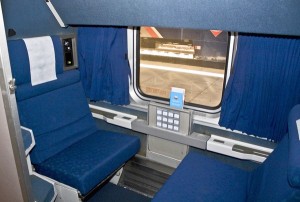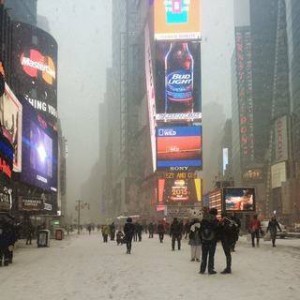 Mrs. T and I left for Florida on December 28 and returned to Manhattan yesterday afternoon. We took an Amtrak sleeper car both ways, and the overnight trip home was as crowded and uncomfortable as its predecessor. Now that I’ve experienced two twenty-four-hour-long journeys in a Viewliner Standard Roomette that was theoretically built for two, I’m less than eager to do it all over again any time soon. Closets were made for storing clothes, not human beings, even those whom apartment life in New York City has long since accustomed to unnaturally close quarters.
Mrs. T and I left for Florida on December 28 and returned to Manhattan yesterday afternoon. We took an Amtrak sleeper car both ways, and the overnight trip home was as crowded and uncomfortable as its predecessor. Now that I’ve experienced two twenty-four-hour-long journeys in a Viewliner Standard Roomette that was theoretically built for two, I’m less than eager to do it all over again any time soon. Closets were made for storing clothes, not human beings, even those whom apartment life in New York City has long since accustomed to unnaturally close quarters.
Still, our voyage was tolerable and not without its modest pleasures. Since Amtrak’s Silver Meteor, incredibly and archaically enough, has no wi-fi service, I spent much of my enforced leisure time on board reading Herman Wouk’s The Caine Mutiny (about which more another day) and most of the rest of it looking out the window of our compartment as America passed me by, unrolling itself in a tranquilizingly continuous stream of uneventful eventfulness. That’s the best part of train travel, and for me it never palls.
 Duke Ellington was another devoted train traveler, and I wrote about why he liked it so much in Duke:
Duke Ellington was another devoted train traveler, and I wrote about why he liked it so much in Duke:
In addition to setting him apart from his sidemen—he slept not in a berth but a roomette—it provided him with “mental isolation…Folks can’t rush you until you get off.” For a touring bandleader whose occupation forced him to compose on the road, such privacy was a must. Ruth Ellington remembered seeing her brother “in a [railroad] siding somewhere in Texas, the heat at 110, the sweat pouring off him on to a piece of manuscript paper on his knee, catching up on something he wanted to finish.” Moreover, he loved the ever-changing sounds of train travel, above all the train whistles: “Especially in the South. There the firemen play blues on the engine whistle—big, smeary things like a goddam woman singing in the night.”
It was natural for such homely sounds to find their way into his work, most famously in “Daybreak Express,” a jazz counterpart of Arthur Honegger’s Pacific 231 that the Ellington band recorded in 1933, ten years after the Swiss composer produced his own exercise in musical onomatopoeia. Like Pacific 231, “Daybreak Express” is an orchestral tour de force that reproduces the sounds of high-speed train travel with uncanny, almost eerie accuracy. Barney Bigard marveled at the way in which Ellington was able to “take an ordinary situation and put it into some music…We’d all be up at night gambling and we’d hear the whistle blow as we went over a crossing. Duke would hear all the same things. The only difference was, we were playing poker and he was writing music about that whistling.” He would do so on many other occasions. Two years later, for instance, he wrote Reminiscing in Tempo, whose rock-steady rhythmic patterns, he explained, were “all caught up in the rhythm and motion of the train dashing through the South.”
I wish I could say that Amtrak had done as well by me, but I didn’t write anything like a miniature masterpiece during either of our long train trips. I did, however, knock out a dozen-odd columns and essays while we were in Florida, several of them about the plays and musicals that I saw there, the seeing of which was the point of the exercise. I also saw several gorgeous sunsets, all of them on Sanibel Island, and rejoiced, as I always do, in the company of my beloved and indispensable Mrs. T. We are never more continuously together than when we are in Florida, and we never fail to enjoy our togetherness.
 I flew back to New York two times to review shows and tried to do so twice more, stymied in both cases by the horrific winter weather that has been pulverizing so much of the country this year. I wasn’t sorry to escape most of it, and I already feel nostalgic for the warmth of Florida, as well as the treasured friends that we’ve made there in recent years. It somehow seems fitting that it started to snow—hard—less than an hour after we got back to our Manhattan apartment.
I flew back to New York two times to review shows and tried to do so twice more, stymied in both cases by the horrific winter weather that has been pulverizing so much of the country this year. I wasn’t sorry to escape most of it, and I already feel nostalgic for the warmth of Florida, as well as the treasured friends that we’ve made there in recent years. It somehow seems fitting that it started to snow—hard—less than an hour after we got back to our Manhattan apartment.
On the other hand, our stay in Florida was in certain ways unusually stressful, for Mrs. T experienced some health problems late in January that forced her to spend a few days in a Sarasota hospital. It’s no fun recuperating in anonymous hotel rooms, even in Florida, for which reason we’re gladder than usual to be home again, free of the nagging burden of sleeping in strange beds and living out of suitcases.
All that said, we’ll both miss the Sunshine State, and it pleases me greatly to know, as I announced in this space three weeks ago, that I’ll be going back there in May of 2016 when Palm Beach Dramaworks mounts Satchmo at the Waldorf, my first play. It happens that I’ve never been in Florida when it’s hot, and I suspect that it will be interesting (to put it delicately) to see what I make of the much-altered climate.
In any case, Mrs. T and I are done with Florida for the time being, and I’ve already jumped back onto the conveyor belt of my everyday life: I’m seeing four shows on and off Broadway this week, and I’ll be pulling on my winter coat to see all four of them. That’s my life, and I wouldn’t do it if I didn’t love it—but I can’t deny that a not-so-small part of me remains down south, sitting by the Gulf of Mexico, listening to the surf crash endlessly on the beach, and thinking about nothing in particular. That’s my life, too.
* * *
Daybreak Express, a 1953 film by D.A. Pennebaker about train travel in New York. The musical score is Duke Ellington’s composition of the same name, recorded by his band in 1934:


